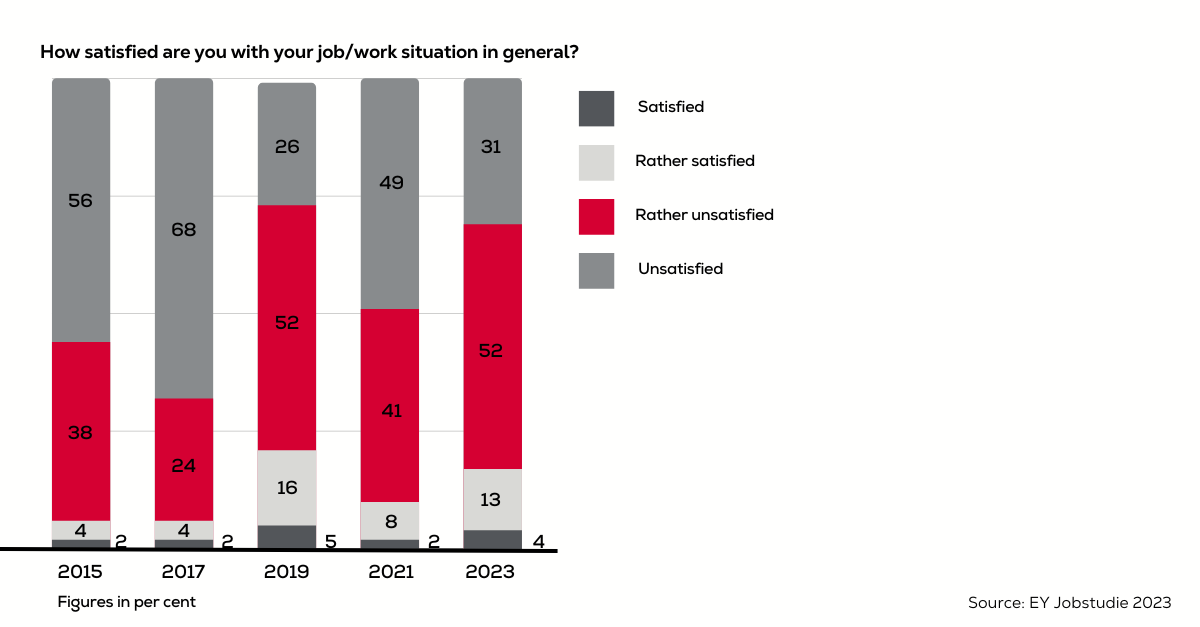The power of empathy in corporate management
Written by Stefan Müller on Nov. 10, 2023

How empathetic leaders strengthen culture and employee loyalty
"A company's culture is at the heart of its identity" is the mantra often proclaimed from the highest levels. In many companies, a certain positive "target culture" is communicated, which reflects the values, norms, goals and expectations of the company and should help to attract and retain employees as well as create trust among the public or on the customer side. A functioning positive corporate culture is the key to the successful implementation of strategies and growth.
But how often does the culture that is actually practised match the propagated "target culture"?
This is a critical question and unfortunately often a taboo subject that is rarely discussed openly by company leaders, let alone with outsiders.
It is generally recognised that employee satisfaction is a clear indicator of a healthy corporate culture. The results of the current "EY Job Study 2023" suggest that there is a glaring gap between desire and reality. According to the study, 55% of top managers are completely satisfied, but this figure is only 34% for the management levels below them and only 29% for specialists. In addition, according to the study, general motivation has fallen sharply in recent years. Only 66% of the employees surveyed are of the opinion that their performance and contribution is recognised.

This discrepancy can be a serious problem that jeopardises employee loyalty in particular and therefore the long-term success of the company. The dilemma lies in the fact that the corporate culture is determined by the behaviour and motivation of the people in the company, regardless of the organisation and processes - and in particular by its leaders.
If the culture is not right, something is wrong with the leadership. You should be that honest.
In order to bring about change in such a situation or, ideally, to prevent it from happening in the first place, leaders essentially need two strong skills: self-reflection and empathy - in short, a high level of emotional intelligence.
The problem is that many leaders simply do not possess this emotional intelligence to a sufficient degree and are not even aware of it. For them, everything is fine or someone else is to blame!
What does the ideal of a modern and successful leader look like?
A modern leader is no longer an order giver; they are a mentor, a coach and a true motivator.
The foundation of a good leadership style consists of clarity and predictability. When employees know what is expected of them and what goals are being pursued, they feel secure and can fulfil their potential. Authenticity is the key here. Real leaders do not play the role of leader, they simply are. This also includes dealing transparently with their own weaknesses and mistakes.
- Respect and appreciation are a key pillar.
- Empathetic leaders don't just listen superficially, they also read between the lines and scrutinise.
- They recognise individual needs and support their employees on their journey.
This support creates added value for both sides. Employees feel valued, are more motivated and perform better, which in turn benefits the company.
The term "participative leadership" may sound complicated at first glance, but it simply means involving employees in decision-making processes. Empathetic leaders know that different perspectives can lead to better results. They give employees the opportunity to contribute ideas and take responsibility. This not only increases the company's innovative strength, but also strengthens employees' sense of autonomy in their area of responsibility.
![]()

»Empathetic leaders create an atmosphere in which employees feel heard and understood. This leads to sustainably higher motivation, as employees see themselves as part of an overall goal and not as interchangeable resources.«
Stefan Müller
![]()
Increased employee loyalty is a logical consequence. Empathetic leaders create connections that go beyond their own workplace. Employees feel part of a team, part of the company. This has a direct positive impact on interdisciplinary cooperation and therefore on the overall performance of the company. At the same time, the fluctuation rate, which is often a significant cost factor, is reduced.
The bottom line is that a positive corporate culture that is practised and in line with the strategy has a strong direct influence on the company's results.
Empathic leadership is certainly not the sole cure-all for success, but in view of the ever faster changing circumstances (technological leaps, GenZ, political and social environment, etc.) and the associated necessary transformations in companies, it is a very important building block for a "change" to have any chance of taking effect at all.
The question remains: How can companies ensure that their leaders have the necessary empathy and incorporate it into their leadership style?
This is where personality diagnostics offers customised solutions. By examining behavioural preferences, motivators and the emotional quotient (EQ), companies can identify leaders who have natural empathic tendencies or the potential to do so.
Behaviour can be trained, but true empathy often stems from an intrinsic quality. Personality diagnostics make it possible to find and develop leaders who are naturally able to put themselves in the shoes of others. Through targeted training, these leaders can further develop their empathic skills and incorporate them into their leadership style.
TriMetrix® is a comprehensive diagnostic process used in recruitment, development and coaching to gain a deeper insight into the behavioural preferences, motivators and emotional intelligence of individuals. It is a tool used by organisations to not only identify the individual strengths and development areas of leaders and employees, but also to provide a basis for team collaboration and development.
In the context of empathic leadership, the findings from the TriMetrix® process can be used to identify leaders who have or can develop empathic skills.
Recognising empathetic leaders
To identify empathic leaders within an organisation, the results of behavioural preferences, motivators and emotional intelligence are analysed and interpreted. Leaders who score high on the behavioural characteristics of influence style, motivators related to social interaction and high emotional intelligence may have the potential for empathic leadership. Targeted coaching and training can then be aimed at further developing these empathy skills.
The process can also be used for comprehensive team assessments to evaluate and promote a team's collective empathy skills. By analysing the behavioural preferences, motivators and emotional intelligence of all team members, an overall picture of team dynamics and capabilities can emerge. Teams that possess diverse empathic skills may be better able to collaborate effectively, resolve conflicts and respond to the needs of their members.
The power of change lies in the hands of leaders. Empathy is not just a skill, it is a catalyst for sustainable success.
The author
About EO Executives
Success in companies is made by people
Success in companies is made by people ("Results through people"). Executives play a particularly important role in this. Our mission is to help our clients build the best leadership team they have ever had.
To do this, we bring together our clients with consultants who are highly individual and have specific knowledge. Our consultants are experts in their respective industries and functional areas. Because our consultants have such a high level of expertise, we ensure that success-critical leadership positions are filled quickly, permanently and successfully.
Successful leadership teams through executive intro®
In addition to competent consultants, our team consists of dedicated researchers and staff – and each brings their extensive knowledge to the search for the perfect executive. Our unique methodical approach, executive intro®, ensures that our candidates are not only convincing from a professional point of view, but also represent a long-term enrichment for the management team and the company on an interpersonal level.
We call this a ”Perfect Match“.
EO Executives was founded in 1997 and is now present in six countries worldwide with a total of 33 locations. We fill positions with both permanent executives and experts as well as quickly available interim managers for temporary assignments and projects. In addition, we support our clients with further consulting services in the areas of executive search, interim management and leadership development.